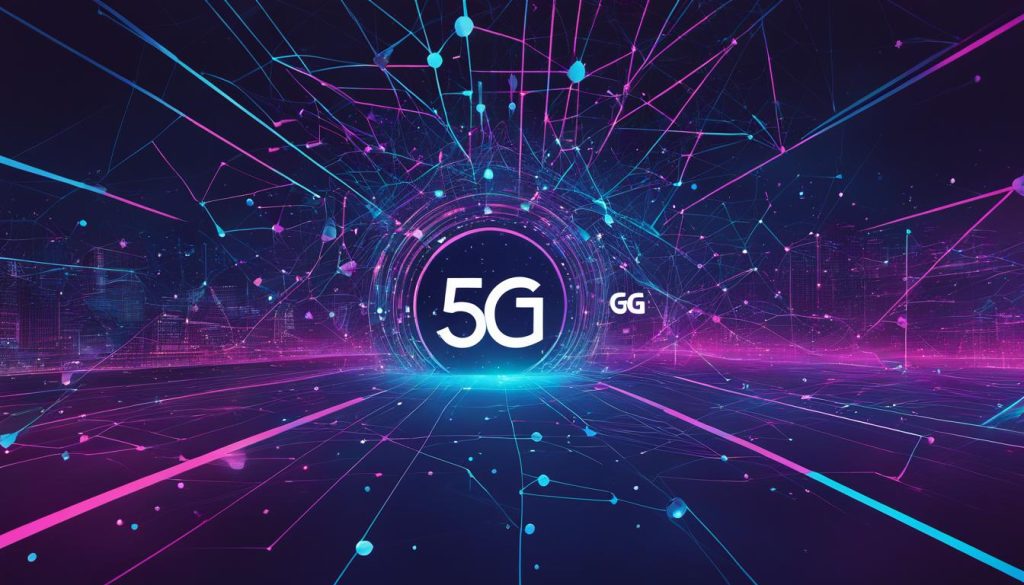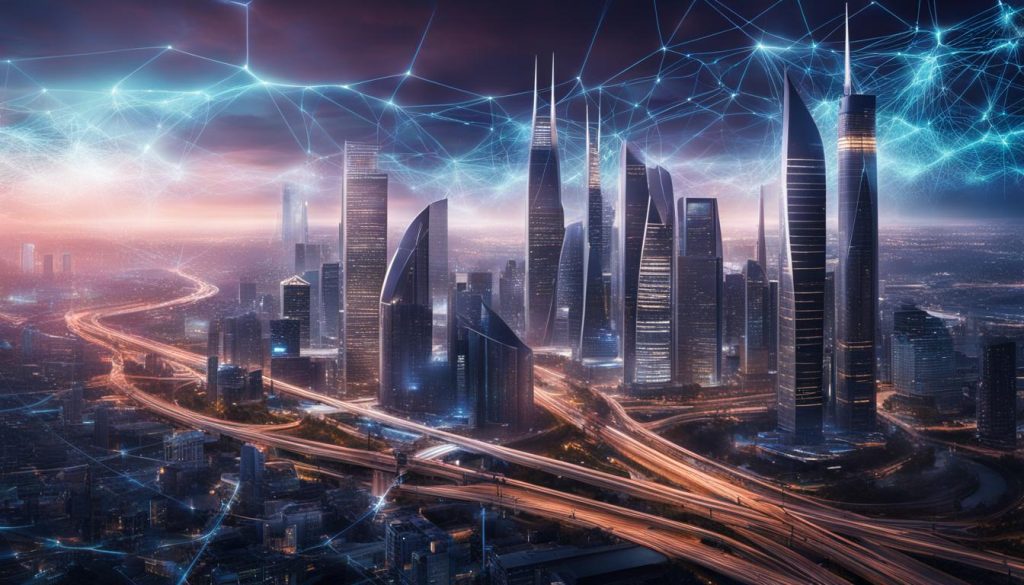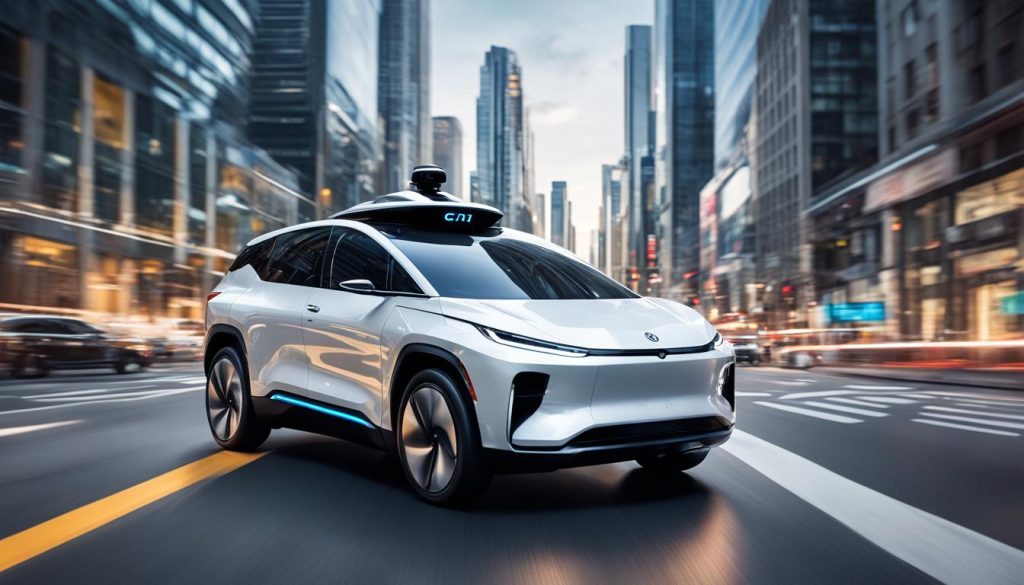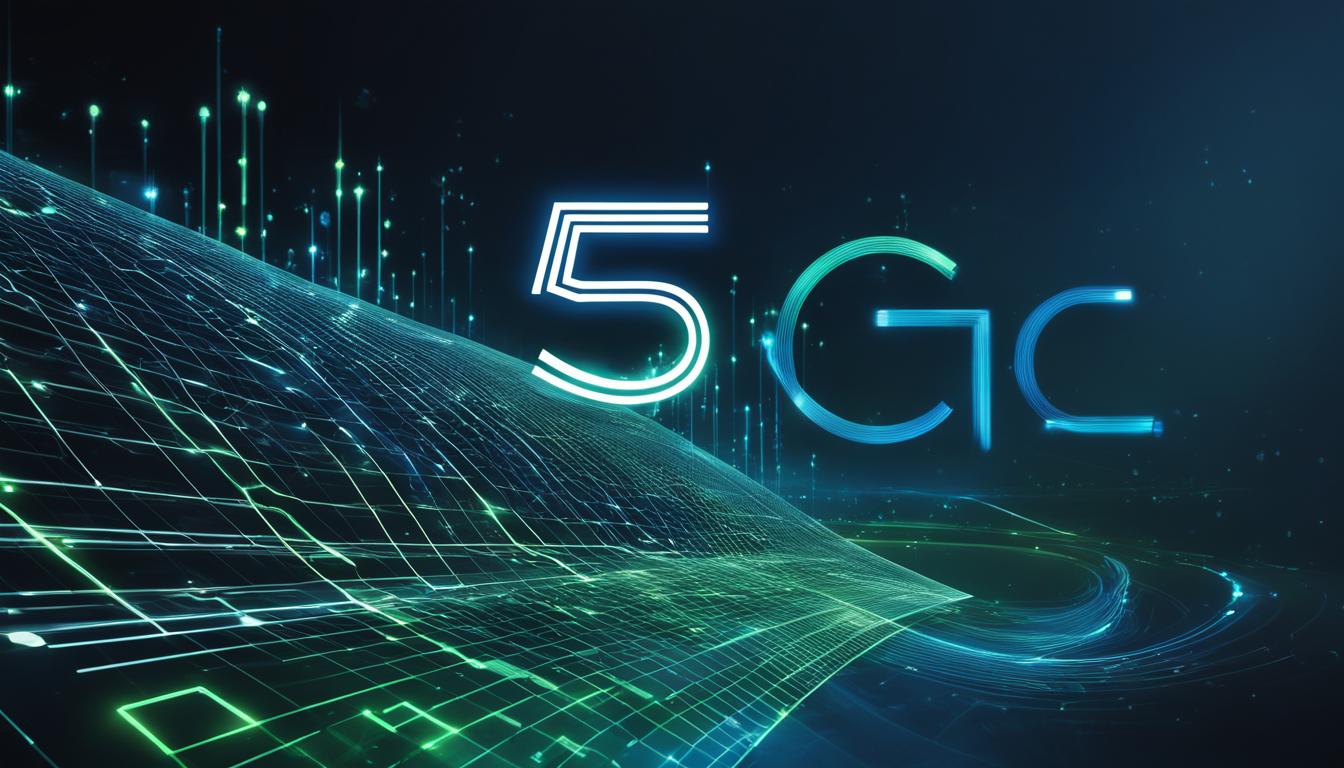The fifth generation of wireless technology, 5G networks, is set to revolutionize connectivity and usher in a new era of speed, capacity, and innovation. With its lightning-fast speeds, massive capacity, and ultra-low latency, 5G promises to transform industries, enable new use cases, and reshape the way we interact with technology.
Unlike its predecessors, 5G is not just about faster download speeds for smartphones and tablets. It is a game-changer that will enable technologies like the Internet of Things (IoT), smart cities, telemedicine, and autonomous vehicles. With 5G, the possibilities are endless.
Key Takeaways:
- 5G networks offer significant improvements in speed, capacity, and latency.
- 5G enables technologies beyond smartphones and tablets, including IoT, smart cities, telemedicine, and autonomous vehicles.
- 5G is not just about faster download speeds, but about enabling new use cases and revolutionizing industries.
- With lightning-fast speeds, massive capacity, and ultra-low latency, 5G paves the way for a future of connectivity.
- The impact of 5G will be felt across various industries, including healthcare, transportation, entertainment, manufacturing, and smart cities.
Understanding 5G Technology
In the world of wireless technology, 5G has emerged as the latest breakthrough, promising faster speeds, lower latency, and greater capacity compared to its predecessors, 3G and 4G. Building upon the foundations laid by these earlier generations, 5G networks operate on higher frequency radio waves, allowing for data delivery at speeds up to 20 times faster than 4G.
With its capability to support more connected devices, 5G opens up a world of possibilities for various applications, most notably the Internet of Things (IoT). This means that in addition to smartphones and tablets, a wide range of devices can now benefit from the power of 5G, including smart home devices, wearables, and even autonomous vehicles.
But what sets 5G apart from its predecessors? Let’s take a closer look at some key features:
- Faster Speeds: With speeds potentially reaching up to 20 gigabits per second (Gbps), 5G allows for lightning-fast downloads, ultra-high-definition streaming, and smooth gaming experiences.
- Lower Latency: Latency refers to the delay in transmitting data from one point to another. 5G offers incredibly low latency, reducing delays to as little as one millisecond (ms). This makes it ideal for real-time applications such as virtual reality, telemedicine, and autonomous vehicles.
- Greater Capacity: 5G networks have a significantly larger capacity to handle a massive number of connected devices. This is especially important as the number of IoT devices continues to grow rapidly. Whether it’s smart city infrastructure, industrial automation, or connected healthcare, 5G can support the increased demand for connectivity.
Comparison with 4G:
To truly appreciate the power of 5G, it’s important to compare it with its predecessor, 4G. Here’s a handy table highlighting the differences:
| Feature | 4G | 5G |
|---|---|---|
| Speed | Up to 100 Mbps | Up to 20 Gbps |
| Latency | 10-20 milliseconds | 1 millisecond or lower |
| Capacity | Limited connections | Massive number of connections |
As you can see, 5G is a game-changer when it comes to speed, latency, and capacity. While 4G paved the way for mobile internet as we know it today, 5G takes it to a whole new level, ushering in an era of seamless connectivity and transformative innovations.

The Need for 5G
The current wireless infrastructure is starting to reach its limits due to the increasing demand for faster speeds and greater capacity. As technology advances and our reliance on mobile devices grows, the need for a more robust and efficient wireless network becomes evident. This is where 5G comes into play.
With its lightning-fast speeds, massive capacity, and ultra-low latency, 5G offers the potential to revolutionize connectivity and enable groundbreaking innovation across various industries. From smart cities to autonomous vehicles, 5G has the power to transform the way we live, work, and interact with the world around us.
5G is not just about faster download speeds, but also about enabling technologies such as Internet of Things (IoT) devices, smart cities, telemedicine, and autonomous vehicles.
With the current wireless infrastructure reaching its limits, 5G becomes a necessity to meet the growing demands of connectivity. The increasing reliance on mobile devices, coupled with the rise of IoT devices and emerging technologies, requires a network that can support the massive influx of data and provide seamless connectivity.
By leveraging advanced wireless technologies and optimizing spectrum utilization, 5G promises to deliver faster speeds, lower latency, and greater capacity. This will enable a range of new applications and use cases that were previously unimaginable, driving innovation across industries and unlocking new opportunities for businesses and consumers.
From healthcare to transportation to entertainment, 5G has the potential to transform various sectors. It will enable real-time communication between patients and healthcare professionals, revolutionize transportation with connected and autonomous vehicles, and enhance user experiences with immersive content and seamless streaming.
As 5G continues to roll out globally, the world is on the brink of a new era of connectivity and innovation. This technology will pave the way for smarter cities, more efficient industries, and a truly connected world.
5G Benefits
| Feature | Explanation |
|---|---|
| Lightning-Fast Speeds | 5G offers speeds of up to 20 gigabits per second (Gbps), enabling tasks to be completed in seconds. |
| Massive Capacity | 5G can support a large number of connected devices simultaneously, making it ideal for IoT and other applications. |
| Ultra-Low Latency | With latency as low as one millisecond (ms), 5G reduces delay and enables real-time applications. |
| Enhanced Reliability | 5G networks provide improved reliability and stability, ensuring consistent connectivity. |
| More Efficient Use of Spectrum | 5G optimizes spectrum utilization, allowing for more efficient use of available frequencies. |

The Power of 5G
When it comes to connectivity, 5G is a game-changer. With its lightning-fast speeds, massive capacity, and ultra-low latency, 5G networks are set to revolutionize the way we communicate and connect.
Lightning-Fast Speeds: 5G technology promises download speeds that are up to 20 times faster than 4G. With potential speeds reaching up to 20 gigabits per second (Gbps), tasks that used to take minutes will now be completed in a matter of seconds. Whether you’re streaming high-definition videos or downloading large files, 5G’s lightning-fast speeds ensure a seamless and uninterrupted experience.
Massive Capacity: 5G networks have the capability to accommodate a massive number of connected devices simultaneously. This means that as more and more devices become connected, from smartphones and tablets to IoT devices and smart appliances, 5G can handle the increased demand without compromising performance. Say goodbye to lag and buffering – 5G’s massive capacity ensures a smooth and reliable connection for all your devices.
Ultra-Low Latency: Latency refers to the delay between when data is sent and when it is received. 5G boasts ultra-low latency, reducing delay to as little as one millisecond (ms). This near-real-time responsiveness is critical for applications that require instantaneous communication, such as autonomous vehicles, telemedicine, and remote control of machinery. With 5G’s ultra-low latency, delays and lag become a thing of the past.
5G’s lightning-fast speeds, massive capacity, and ultra-low latency unlock a world of possibilities. Whether it’s streaming high-quality content, utilizing IoT devices, or enabling real-time communication, 5G is the key to unlocking the full potential of our connected world.
Specific Use Cases and Industries
5G technology has far-reaching implications for various industries, transforming the way we live, work, and interact with the world around us. Let’s explore some specific use cases where 5G’s capabilities shine:
Revolutionizing the Internet of Things (IoT)
With its lightning-fast speeds and massive capacity, 5G is set to revolutionize the Internet of Things (IoT). It enables seamless communication and real-time data exchange between interconnected devices, paving the way for smart homes, connected vehicles, and industrial automation. The IoT ecosystem will thrive on the backbone of 5G connectivity, bringing us closer to a truly interconnected world.
Enabling Smart Cities
5G is a key enabler for the development of smart cities. It empowers efficient traffic management systems that can optimize traffic flow and reduce congestion. With the ability to handle a massive number of connected devices, 5G facilitates smart energy grids that optimize consumption and reduce waste. Moreover, 5G enhances public safety by enabling real-time monitoring and better emergency response systems.
Transforming Telemedicine
In the healthcare sector, 5G has the potential to transform telemedicine and remote patient monitoring. Its ultra-low latency enables real-time communication between healthcare professionals and patients, regardless of geographic location. This allows for more accurate diagnoses, timely interventions, and personalized patient care. With 5G, healthcare becomes accessible to a wider population, irrespective of physical distance.
Powering Autonomous Vehicles
5G networks play a critical role in the development and deployment of autonomous vehicles. With their ability to provide real-time communication between vehicles, 5G networks ensure safer and more efficient transportation. This enables vehicles to exchange data on road conditions, traffic patterns, and potential hazards, leading to enhanced driving experiences and reducing the risk of accidents.
Enhancing Gaming and Entertainment
5G brings significant enhancements to the gaming and entertainment industry. It enables cloud gaming, allowing players to enjoy high-quality, immersive gaming experiences without the need for expensive hardware. With 5G’s low latency and fast speeds, streaming platforms can provide seamless high-definition content, making movie and TV streaming more enjoyable and accessible.
| Industry | 5G Impact |
|---|---|
| Internet of Things (IoT) | Revolutionizes IoT with seamless communication and real-time data exchange between interconnected devices. |
| Smart Cities | Enables efficient traffic management, optimized energy consumption, and improved public safety. |
| Telemedicine | Facilitates remote patient monitoring and real-time communication between healthcare professionals and patients. |
| Autonomous Vehicles | Provides real-time communication between vehicles, leading to safer and more efficient transportation. |
| Gaming and Entertainment | Enables cloud gaming and high-quality streaming for immersive gaming and entertainment experiences. |
These are just a few examples of the diverse range of industries that can benefit from the power of 5G. As 5G continues to evolve and expand its footprint, we can expect even more exciting use cases and innovations in the future.

Advantages of 5G over 4G
When it comes to speed, capacity, and efficiency, 5G outshines its predecessor, 4G, in several ways. Let’s explore the key advantages that make 5G a game-changer in the world of wireless technology.
Faster Speeds and Greater Capacity
One of the most significant advantages of 5G is its lightning-fast speeds. With the potential to reach up to 20 gigabits per second (Gbps), 5G allows tasks to be completed in seconds, revolutionizing the way we access and transfer data.
Moreover, 5G provides a massive increase in capacity compared to 4G networks. This means that more devices can be connected simultaneously, ensuring smooth and uninterrupted browsing, streaming, and communication experiences for users.
Lower Latency for Real-time Applications
Lower latency is another notable feature that sets 5G apart from 4G. Latency refers to the time it takes for data to travel from the sender to the receiver. With 5G’s ultra-low latency of as little as one millisecond (ms), real-time applications such as video conferencing, online gaming, and autonomous vehicles can thrive, offering seamless and responsive experiences.
Enhanced Reliability
5G networks are designed to provide enhanced reliability, ensuring consistent and stable connections even in densely populated areas. This reliability is crucial for industries that rely on mission-critical communication, such as healthcare, transportation, and manufacturing.
More Efficient Use of Spectrum
5G technology utilizes spectrum more efficiently compared to 4G, enabling higher data transfer rates without occupying additional bandwidth. This efficiency allows for better allocation and optimization of available spectrum resources, leading to improved network reliability and performance.
| Advantages | 5G | 4G |
|---|---|---|
| Speed | Faster speeds of up to 20 Gbps | Slower speeds |
| Capacity | Increased capacity for more connections | Limited capacity for simultaneous connections |
| Latency | Ultra-low latency of 1 ms | Higher latency |
| Reliability | Enhanced reliability even in dense areas | Reliability varies depending on network congestion |
| Spectrum Efficiency | More efficient use of spectrum resources | Less efficient use of spectrum resources |
The Impact of 5G on Industries
5G technology has the potential to revolutionize various industries, transforming the way we live, work, and interact. Let’s explore how 5G is set to impact healthcare, transportation, entertainment, manufacturing, and smart cities.
In the healthcare sector, 5G enables real-time communication between patients and healthcare professionals, leading to improved telemedicine services. With the high-speed, low-latency connectivity of 5G, remote patient monitoring becomes more efficient and personalized medicine becomes more accessible. Healthcare professionals can deliver enhanced care and diagnosis from anywhere, ensuring timely and quality medical assistance.
When it comes to transportation, 5G opens doors to connected and autonomous vehicles. With its ultra-low latency, vehicles can communicate with each other in real-time, enhancing safety and efficiency on the roads. 5G-powered transportation systems can optimize traffic flow, reduce congestion, and enable reliable navigation systems, transforming the way we commute.
Entertainment experiences are taken to the next level with the introduction of 5G. The lightning-fast speeds and massive capacity of 5G networks enable seamless streaming, high-quality gaming, and immersive content consumption. Users can enjoy uninterrupted entertainment on their devices, whether it’s streaming movies, playing online games, or engaging with virtual reality (VR) experiences.
In the manufacturing industry, 5G technology drives the evolution towards smart factories. With its reliable and fast connectivity, 5G promotes increased automation, efficient production processes, and real-time monitoring of equipment and systems. This results in improved productivity, reduced downtime, and optimized supply chains, revolutionizing the manufacturing landscape.
Smart cities leverage the potential of 5G to enhance urban living. With 5G-enabled smart traffic management systems, cities can optimize transportation logistics, reduce emissions, and create efficient transportation networks. Additionally, 5G-powered smart grids in energy management enable better utilization of resources, leading to reduced energy consumption and improved sustainability. 5G also plays a crucial role in improving public safety through enhanced surveillance and quick emergency response systems.
As 5G networks continue to expand and evolve, these industries are set to undergo significant transformations. With faster speeds, lower latency, and increased capacity, 5G is paving the way for a future where connectivity empowers innovation and enhances our daily lives.
FAQ
What is 5G technology?
5G is the fifth generation of wireless technology that promises significant improvements in speed, capacity, and latency. It aims to revolutionize connectivity beyond just smartphones and tablets, enabling new use cases across various industries.
How is 5G different from 3G and 4G?
5G builds upon the foundation of 3G and 4G by providing faster speeds, lower latency, and greater capacity. It operates on higher frequency radio waves, which enables it to deliver data at up to 20 times the speed of 4G. 5G networks can accommodate more connected devices, making it ideal for applications such as IoT.
Why do we need 5G?
The current wireless infrastructure is starting to reach its limits due to the increasing demand for faster speeds and greater capacity. 5G is necessary to meet these growing demands and enable new technologies that have the potential to change the way we live, work, and interact with the world around us.
What are the advantages of 5G?
5G offers lightning-fast speeds, potentially reaching up to 20 gigabits per second (Gbps). It also provides a massive increase in capacity, allowing a large number of connected devices to be supported simultaneously. Additionally, 5G has ultra-low latency, reducing delay to as little as one millisecond (ms).
How does 5G impact different industries?
5G has implications for various industries. It can revolutionize IoT by supporting seamless communication and real-time data exchange between interconnected devices. In smart cities, 5G can enable efficient traffic management, optimized energy consumption, and improved public safety. In the healthcare sector, 5G can facilitate telemedicine and remote patient monitoring. For autonomous vehicles, 5G provides real-time communication between vehicles, leading to safer and more efficient transportation. Additionally, 5G enhances the gaming and entertainment industry by enabling cloud gaming and high-quality streaming.
How is 5G better than 4G?
5G offers several advantages over 4G. It provides faster speeds and greater capacity, enabling tasks to be completed in seconds. 5G also has lower latency, making it ideal for real-time applications. With improved reliability and more efficient use of spectrum, 5G enhances user experiences and allows for increased innovation and connectivity.
What is the impact of 5G on industries?
5G has the potential to transform various industries. In healthcare, it enables real-time communication between patients and healthcare professionals, remote monitoring, and personalized medicine. 5G revolutionizes transportation by facilitating connected and autonomous vehicles, optimizing traffic flow, and improving driver safety. In entertainment, 5G enhances user experiences with seamless streaming and immersive content. In manufacturing, 5G enables smart factories and increased automation. Lastly, in smart cities, 5G supports various applications such as smart traffic management, energy grid optimization, and improved public safety. 5G is expected to have a positive impact on the future of connectivity across these industries.




